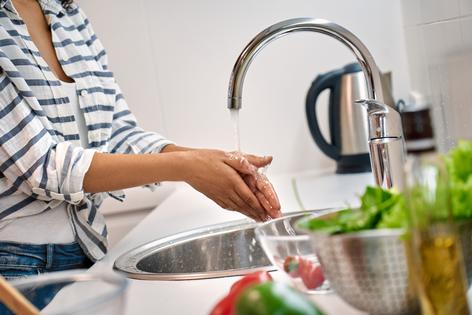4 summer food-safety tips
Published in Health & Fitness
Picnics, backyard barbecues, beach cookouts — dining al fresco is one of summer’s best perks. But it’s easy to forget that as the temperature rises, so does your chance of getting sick from contaminated food. Bacteria thrive in warmer conditions, and people are cooking outdoors frequently — away from sinks, refrigerators and kitchen thermometers
What can you do to avoid the unpleasant experience of food poisoning this summer?
1. Stay clean.
Washing hands, surfaces and food is one of the easiest ways to prevent foodborne illnesses. “In some cases people know about the basics but they don’t always do them, and obviously these practices are well worth the time,” says Shelley Feist, executive director of the Partnership for Food Safety Education.
Always wash hands with soap and water for at least 20 seconds before and after handling food. If you are outdoors without access to a sink, use antibacterial hand sanitizer as an alternative.
Rinsing fruits and vegetables is as simple as running tap water over them, but without access to running water it can be difficult. Washing your food before packing it in your picnic basket will ensure that the food is clean—even if your campsite doesn’t have fresh water.
2. Separate raw food.
During grilling season it can be more difficult to avoid cross-contamination because there’s often less access to clean surfaces and dishes. “When raw meat goes on the grill you can’t put it back on the same platter you brought it out on,” says Feist. Have an extra plate on hand or thoroughly wash any utensil, dish or surface that has touched raw meat or seafood with hot, soapy water before reusing.
Cross-contamination can also occur when traveling if raw meat, seafood and poultry aren’t wrapped properly. Carefully wrap food and place it in a separate cooler (or at the bottom of the cooler) to prevent any raw juices from leaking and contaminating other foods.
3. Cook food thoroughly.
Don’t depend on the color of meat or seafood to determine whether or not it’s cooked thoroughly. “Consumers are stubbornly stuck on visual indicators but, for both quality and safety, using a thermometer gives you an idea that it’s safe and not overcooked,” says Feist.
4. Keep cold food cold.
Traditional picnic baskets may look pretty, but they won’t keep your food at a safe temperature for long. And since it’s necessary to discard any food that has been left out in the summer sun for more than two hours (one hour if the temperature exceeds 90 degrees), choose a well-insulated cooler filled with ice instead.
Though a cooler is never an ideal replacement for a refrigerator because a home refrigerator should be kept at 40 degrees or below, there are four easy ways to slow down the growth of harmful bacteria:
(Real Simple magazine provides smart, realistic solutions to everyday challenges. Online at www.realsimple.com.)
©2021 Meredith Corporation. Distributed by Tribune Content Agency, LLC.







Comments